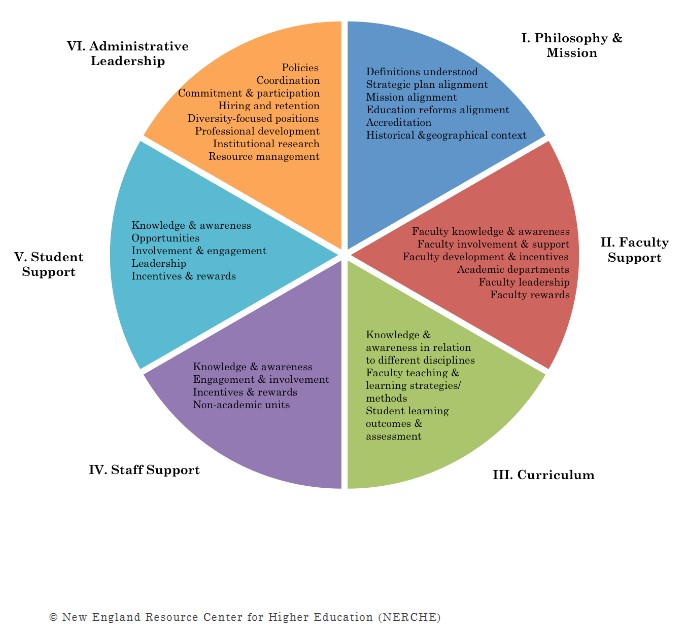A Diversity, Equity, Inclusion, and Social Justice Workgroup convened in September of 2021 to develop strategies for more intentionally addressing our collective DEI objectives as part of the planned System Transformation. As a starting point, the workgroup recommended that the System adopt the DEI Self-Assessment Rubric from the New England Resource Center for Higher Education (NERCHE) to guide the teams in their Discovery and Design work. The teams’ strategic alignment with DEI goals would also be evaluated at each milestone of the project management process to ensure strategic alignment.

The Workgroup’s recommendations were endorsed by the Transformation Sponsors, and they were charged by the sponsors to provide training, guidance, and coaching to the teams as they worked through the project management process. The same recommendations were endorsed by the Diversity, Equity, and Inclusion (DEI) Committee of the Board of Trustees at their October 15th meeting, and the Committee further approved the NERCHE definitions for diversity, inclusion, and equity to serve as the foundation of the VSC System’s DEI work.
Definitions
The Board of Trustees voted on October 25th, 2021 to approve the definitions of “diversity,” “equity,” and “inclusion” used by the New England Resource Center for Higher Education (NERCHE) in its Self-Assessment Rubric for the Institutionalization of Diversity, Equity, and Inclusion in Higher Education, with one amendment—the inclusion of “gender identity” in the definition of “diversity”—as follows:
Diversity: Individual differences (e.g., personality, learning styles, and life experiences) and group/social differences (e.g., race/ethnicity, class, gender, gender identity, sexual orientation, country of origin, physical or cognitive abilities, as well as cultural, political, religious, or other affiliations) that can be engaged in the service of learning.
Inclusion: The active, intentional, and ongoing engagement with diversity—in people, in the curriculum, in the co-curriculum, and in communities (intellectual, social, cultural, geographical). This engagement with diversity has the potential to increase one’s awareness, content knowledge, cognitive sophistication, and empathic understanding of the complex ways individuals interact within systems and institutions.
Equity: Creating opportunities for equal access and success for historically underrepresented populations, such as racial and ethnic minority and low-income students, in three main areas:
- Representational equity, the proportional participation at all levels of an institution;
- Resource equity, the distribution of educational resources in order to close equity gaps; and
- Equity-mindedness, the demonstration of an awareness of and willingness to address equity issues among institutional leaders and staff.
NERCHE’s Self-Assessment Rubric will be used as part of the ongoing transformation work.
3 Pillars
There are 3 Pillars of Diversity, Equity, Inclusion and Social Justice that are being considered by every one of the transformation teams to help inform their work. They are:
- Data-Informed Decisions about Diversity, Equity, Inclusion, and Social Justice
- Professional Knowledge of Diversity, Equity, Inclusion, and Social Justice
- Personal Knowledge of Diversity, Equity, Inclusion, and Social Justice
To place these 3 pillars of DEISJ within the context of our transformation work we ask teams:
How can you incorporate the framework of DEISJ into your work processes and decision making?
- Data-Informed Decisions: Are your work processes shaped by data-informed decisions related to diversity, equity, inclusion, and social justice?
- Professional Knowledge: Can your work process reviews address an institutional need around diversity, equity, inclusion, and social justice? Are you asking questions in a way that facilitates opportunities for discussion around a related issues of diversity, equity, inclusion, and social justice?
- Personal Knowledge: Are you seeking opportunities to increase your own knowledge of diversity, equity, inclusion, and social justice?
Diversity Statement
On May 16th, 2022, the VSCS Board of Trustees adopted a system-wide Diversity Statement.
Diversity, Equity, Inclusion, and Social Justice Updates
-
Diversity, Equity, Inclusion, and Social Justice Update (05/15/23)
At the May 8, 2023, meeting of the Board of Trustees DEI Committee, Mary Brodsky, Dean of People and Culture for the Community College of Vermont, and Jae Basiliere, Chief Diversity Officer at Vermont State University, each gave an update on the past year of work regarding diversity, equity, and inclusion at their respective institutions.…
-
Celebrating Black History Month
Black History Month is celebrated in February throughout the United States. It began in 1926 when Carter G. Woodson founded Black History Week and expanded to a full month in the 1970s. The theme for February 2023 is honoring and celebrating Black Resistance. On January 31, 2023, Governor Phil Scott signed a proclamation recognizing Black…
-
Title IX and Protected Rights Coordinator for VTSU
On November 14, 2022, we welcomed Amy Daviarz, the new Title IX and Protected Rights Coordinator for Vermont State University. The Title IX and Protected Rights Coordinator will manage and execute policies and programs which relate to protected categories under state and federal laws such as Title IX, Title VII, and the ADA, and to…
